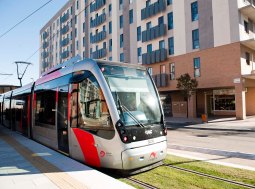FCC Construcción is awarded the construction, operation and maintenance of Line 1 of the Zaragoza Tram
FCC Construcción is awarded the construction, operation and maintenance of Line 1 of the Zaragoza Tram
The new service, considered the most modern in Spain due to its technology, will be fully operational in 2013.

The TRAZA consortium, made up of FCC Construcción, TUZSA, Acciona, CAF, Ibercaja and Concessia, has been provisionally awarded the tender called by the Zaragoza City Council to select the partner of a mixed company in charge of building, putting into service, maintaining and operating the Line I of the Zaragoza Tram for a period of 35 years.
The tram line will connect Parque Goya and Valdespartera and will have a total length of 12.8 kilometers and will have 25 stops. The total travel time between ends will be 40 minutes and it is expected to be operational in 2013.
The project, which involves an initial investment of approximately 340 million euros, of which 130 million will be contributed 50% by the Zaragoza City Council and the Aragon Provincial Council, will provide the city with the most modern tramway in Spain.
The works consist of the construction of a railway platform on a segregated surface for electrified double track, crossing the city of Zaragoza from North to South.
It will be executed in two consecutive phases:
- Phase 1 (Valdespartera-Gran Vía)
- Phase 2 (Gran Vía- Parque Goya)
In addition, the project includes the construction of two garages and workshops, one for each phase, as well as two car parks and an interchange. The contract includes the supply of rolling stock as well as all the equipment.
The winning proposal, TRAZA, includes the use of CAF's URBOS III tram model, which will be manufactured at its plant in Zaragoza. These are vehicles 33 meters long, expandable to 43 meters, and 2.65 wide. Each composition has a capacity of 200 passengers, of which 54 would be seated. They are low-floor trams, which fully facilitates access for people with reduced mobility. Its maximum speed will be set at 50 kilometers per hour, although the commercial speed (average speed including stops) will be 19 kilometers per hour.
As established in the specifications, the central part of the tram route, between Gran Vía and Puente de Santiago, will not have a catenary. To meet this requirement, the TRAZA proposal will include the ACR (Fast Charge Accumulator) system, which allows for each stop to take enough energy to reach the next one. In addition, these trams will recover braking energy, which will imply savings of up to 35% of the necessary electricity consumption.








